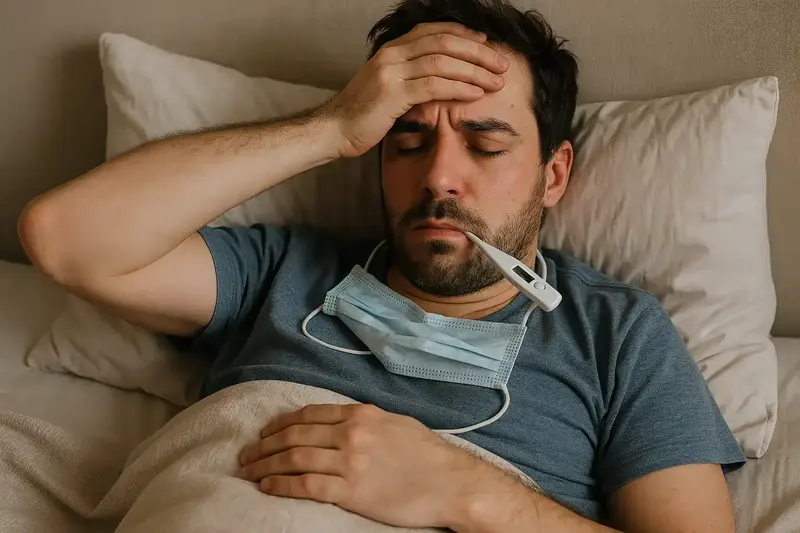- Published on: Aug 10, 2024
- 2 minute read
- By: SecondMedic Expert
Fever And Over-the-Counter Medications: What's Safe?
Fever is your body's natural defense mechanism against infections. It's essentially a temporary increase in your body's temperature, signaling that your immune system is working overtime to combat invaders. While often uncomfortable, fever is typically a beneficial process.
It's important to distinguish between a harmless fever and a cause for concern. Generally, fever in adults is less alarming than in children. However, certain symptoms should prompt medical attention, such as:
-
Fever in infants under 3 months: This always warrants a call to your pediatrician.
-
High fever with severe symptoms: A fever accompanied by stiff neck, severe headache, confusion, difficulty breathing, seizures, or persistent vomiting requires immediate medical evaluation.
-
Fever that persists or worsens: A fever lasting more than 3 days without improvement or one that recurs after seeming to resolve should be checked by a healthcare provider.
Over-the-Counter Medications: A Cautious Approach
Over-the-counter (OTC) medications can help alleviate fever symptoms like pain and discomfort. However, they're not a cure for the underlying infection and should be used judiciously.
Common OTC options include:
-
Acetaminophen (Tylenol): Generally considered safe for adults and children when used as directed. It reduces fever and mild to moderate pain.
-
Ibuprofen (Advil, Motrin): Effective for fever and pain, but should be avoided in children under 6 months.
-
Aspirin: Not recommended for children due to the risk of Reye's syndrome, a rare but serious condition.
It's crucial to follow the dosage instructions on the medication label precisely. Overuse can lead to adverse effects. Additionally, inform your doctor about any other medications you're taking, as they may interact with OTC drugs. If you have allergies to certain ingredients, choose alternative options.
When to Seek Professional Help
While OTC medications can provide temporary relief, there are instances when consulting a doctor is essential:
-
Fever in infants under 3 months: Always seek medical attention.
-
High fever with severe symptoms: This combination demands immediate medical evaluation.
-
Fever that doesn't respond to treatment: If OTC medications fail to reduce fever after a reasonable period, consult a healthcare provider.
-
Fever that returns: A recurring fever warrants medical attention to determine the underlying cause.
Natural Remedies: Exploring Alternatives
Many people turn to natural remedies for fever relief. While scientific evidence supporting their efficacy is often limited, some commonly used options include:
-
Hydration: Drinking plenty of fluids helps regulate body temperature and prevent dehydration.
-
Rest: Allow your body to focus its energy on fighting the infection.
-
Cool Compresses: Applying cool clothes to the forehead can provide temporary comfort.
It's essential to remember that natural remedies may not be suitable for everyone, especially those with underlying health conditions. Always consult with a healthcare provider before trying new approaches.
Prevention: Staying Healthy
While not foolproof, adopting preventive measures can help reduce the risk of infections that lead to fever:
-
Vaccination: Stay up-to-date on recommended vaccines to protect against various infectious diseases.
-
Hand Hygiene: Frequent handwashing with soap and water is crucial in preventing the spread of germs.
-
Healthy Lifestyle: Maintain a balanced diet, regular exercise, and adequate sleep to bolster your immune system.
Conclusion
Fever is a normal bodily response to infection, often serving a protective role. While OTC medications can help manage symptoms, they should be used cautiously and in accordance with label instructions. If fever is accompanied by severe symptoms or persists, take doctor consultation. Natural remedies may offer additional relief, but their effectiveness varies. Prioritizing prevention through vaccination, good hygiene, and a healthy lifestyle can significantly reduce the risk of fever.
Read FAQs
A. No, aspirin should never be given to children due to the risk of Reye's syndrome. Acetaminophen or ibuprofen are safer alternatives for fever reduction in children.
A. A fever that lasts more than 3 days without improvement, is accompanied by severe symptoms, or returns after initial improvement should prompt a visit to the doctor.
A. While combining these medications might seem tempting, it's generally not recommended without consulting a healthcare provider. Overuse of these medications can lead to adverse effects.









